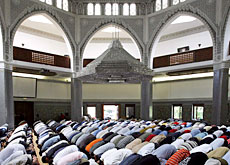Pointing to the pitfalls of language testing

As much as language is an important symbol of identity and belonging in a society, it can also be used as a barrier in times of tighter immigration policy.
While there is no universal language test in Switzerland for residence or citizenship applicants in Switzerland, with three sets of naturalisation requirements to satisfy – federal, cantonal and communal – most applicants come up against some form of citizenship or language exam.
Tim McNamara, applied linguistics professor at the University of Melbourne and a language assessment specialist spoke to swissinfo.ch about how the use of language assessment is evolving.
McNamara, whose research focuses on the social and political context of such tests in immigration and citizenship procedures, says people can participate successfully in society even if they are not fluent in the national language.
The academic was in Switzerland to give a workshop on the subject at Fribourg’s Institute of Multilingualism.
swissinfo.ch: Could you give an example of how language assessment is being used in immigration and citizenship procedures?
Tim McNamara: A number of countries in Europe in the last few years, partly as a reflection of tensions within the countries associated with immigrant communities, have gradually begun to use language assessments at different stages of the immigration process.
Obviously there has been a tradition in some countries for many years of requiring knowledge of a national language for citizenship, though that has increased so that more and more countries are following suit.
Language tests are also now being used at earlier stages. Recently in the Netherlands and the United Kingdom to be able to marry a citizen of the country concerned, foreign nationals need to take a language test even before they leave their own country to get a visa.
swissinfo.ch: Is there a problem with the validity of these assessments?
T.M.: As part of the professional development of language tests we need to be sure that the conclusions we are reaching about individuals have some sort of basis. It’s very easy, as we know, to reach a conclusion about a person based on a limited amount of evidence that we find out later to be wrong.
So validation of tests involves a process for finding out more information about a sample of the candidates, for example, to see if the conclusions that the tests arrived at are borne out by other kinds of investigation and other kinds of evidence.
I think with immigration and citizenship there is another issue as well. One of the aspects of validity is what are the social and cultural values which are involved in the practice of the assessment?
Sometimes there is a heated discussion in a country about the presence of immigrant communities and as part of this discussion there can be a resort to language testing on grounds that are sometimes not entirely clear.
swissinfo.ch: When you have this political context, would you then conclude that it’s not possible to test somebody fairly or objectively, that it will always be coloured by personal views?
T.M.: No, you might be able to test them fairly and objectively but you can ask what is the relevance of this? What is the real meaning of this testing practice? This has been studied in the United States and in Luxembourg and the Netherlands and it seems to me that while the tests appear to be in the interests of the immigrants, it’s pretty clear that what is going on is a debate in society about the symbols of belonging and not belonging and language is a pretty convenient symbol for that.
We need to be able to understand the meaning of tests in two ways – one is as a practical instrument for making decisions about people and these practical instruments can be of good quality or of poor quality. Obviously they need to be as good quality as we can make them.
On the other hand the very use of the instrument at all needs to be considered and thought about. Here there is no correct answer of course because we’re entering into the realm of values and policies and political discussions but I think it’s important to recognise that that’s what’s involved in the language test. It’s not just a technical instrument for making a decision about a person in a scientific way but that it’s an expression of social and cultural and political values and these will necessarily be contested.
swissinfo.ch: If we look at a society as a club that outsiders may wish to join, then surely it’s fair to say, as the Swiss justice minister recently did, that knowledge of a national language is not too much to ask as a condition for integration?
T.M.: Well I think that there’s a difference between entry to a society and participation at the highest level through citizenship. Studies in immigrant countries have shown that effective and successful citizenship does not necessarily depend primarily on language.
In more traditional societies a more traditional view prevails and that’s certainly the case in many European countries. They are struggling with their identity as immigrant societies. In many ways the argument about competence in the main language of the society is a reasonable one, especially for citizenship, but for other kinds of participation in society we know that people can participate successfully even if their competence in the national language is rather poor.
It’s very easy for policymakers to reach for the gun of the language test but even though I agree that there is a strong argument for including language as a criterion for readiness to participate, I think that what it means to be a good citizen is a much more complex matter than that.
Building on a career as an EFL/ESL teacher and teacher trainer in Australia and Britain, Tim McNamara has taught Applied Linguistics at the University of Melbourne since 1987.
His language testing research has focused on performance assessment, theories of validity, the use of Rasch models, and the social and political meaning of language tests.
The professor is the author of Language Testing (OUP, 2000) and co-author (with Carsten Roever) of Language Testing: The Social Dimension (Blackwell, 2006) and a frequent speaker at international conferences.
He has served on the board of various linguistics publications including Applied Linguistics, TESOL Quarterly,Annual Review of Applied Linguistics and the International Journal of Applied Linguistics.
People who have been resident in Switzerland for 12 years may apply for naturalisation.
The Federal Migration Office examines whether applicants are integrated in the Swiss way of life, are familiar with Swiss customs and traditions, comply with the Swiss rule of law, and do not endanger Switzerland’s internal or external security.
This examination is based on cantonal and communal reports. Then naturalisation proceeds in three stages.
Swiss citizenship is only acquired by those applicants who, after obtaining the federal naturalisation permit, have also been naturalised by their communes and cantons.
As a rule, there is no legally protected right to being naturalised by a commune and a canton.

In compliance with the JTI standards
More: SWI swissinfo.ch certified by the Journalism Trust Initiative
















You can find an overview of ongoing debates with our journalists here . Please join us!
If you want to start a conversation about a topic raised in this article or want to report factual errors, email us at english@swissinfo.ch.